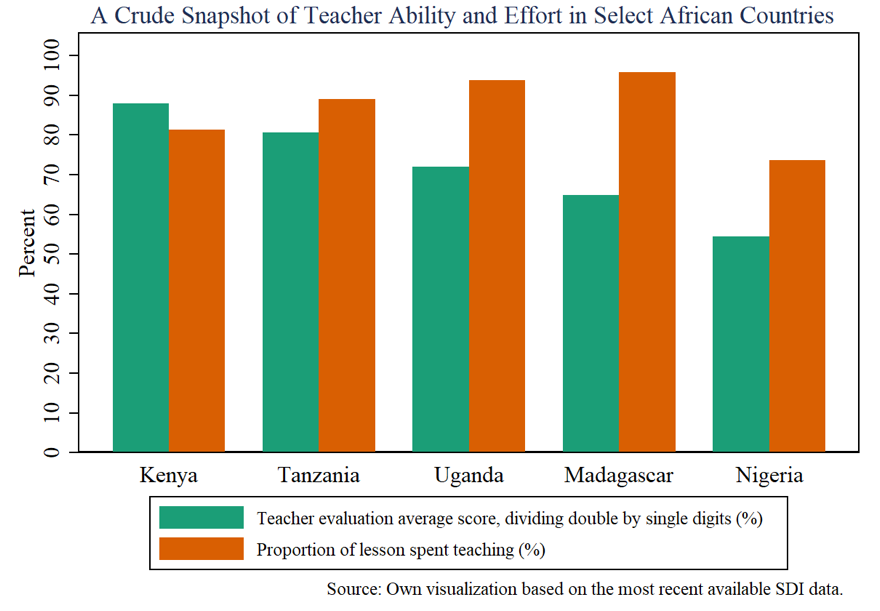Maryam Akmal
Center for Global Development
Blog
Here are a few facts:
These facts, and the many others like them that have emerged from research, reveal the extent of the global learning crisis. They are at the heart of DFID’s new education policy refresh, “Get Children Learning.” The cost of ignoring or ineffectively acting on the learning crisis is high: if we do nothing, half of the world’s children and youth will be out of school or failing to learn by 2030 (The Learning Generation, Education Commission).
The good news is that stakeholders are taking notice. DFID’s new education strategy to tackle the learning crisis prioritizes a pivotal part of any well-functioning education system: good teaching. It is obvious that any attempt to reform education systems cannot work if it does not generate effective teaching practices, which requires skilled and motivated teachers in the classroom.
While good teaching is a key component of any education system, available statistics on teacher ability and motivation paint a dismal picture. The Service Delivery Indicators (SDI) from Africa show that a good fraction of existing teachers are functionally illiterate and innumerate. Data from Nigeria suggest that less than 6 in 10 teachers could do a simple division problem (something almost 90 percent of teachers in Kenya could do). Statistics on classroom effort aren’t encouraging either.

DFID is right to focus on teachers who can and do teach well. However, as the DFID policy notes, creating accountable and effective systems that recruit, retain, and motivate good teachers requires system-level reform. For example, often teachers are judged based on simply pushing kids through grades, rather than based on whether the children actually learned. Parents, on the other hand, rightly expect their children to come out of early grades being able to read, write and do simple math. As the recent World Development Report 2018 on education and the RISE accountability framework emphasize, the alignment and coherence of the objectives of the various stakeholders is key to effective systems.
Based on findings from the United States and evidence from Pakistan, we know that there are big differences in the learning progress of students with different teachers. Estimates of teacher-specific “learning value-added”—the contribution the teacher makes to student learning—show huge, persistent differences across teachers. However, the research also finds that these measures of “teacher value-added” have very low association with “thin” observables about teachers, like age, seniority, sex, and formal qualifications. The “thin” versus “thick” distinction builds off the anthropologist Clifford Geertz’s notion of “thick description,” the political scientist James Scott’s distinction between metis (practical knowledge) and techne (technical knowledge) in his book Seeing Like a State, and economists' distinctions in principal-agent models of the ease of “contractibility.” Quality teaching is a “thick” practice; it takes the application of practical knowledge.
But many education systems are hierarchical bureaucracies that manage teachers exclusively around “thin” characteristics and observables, such as formal qualifications, training, seniority, etc. We don’t want to fall into the trap of defining “quality teachers” based on a set of thin bureaucratic criteria that ignore quality teaching. Quality teachers are those who practice quality teaching.
Creating well-functioning education systems that support good teaching will be complex and challenging. The goal of RISE, an education research programme initiated and funded by DFID (along with DFAT), is to understand how to create systems that deliver learning for all at scale. DFID’s education policy is right to note that there are useful lessons to be learnt from other countries. For example, Vietnam outperformed many wealthy countries, including the United States, on PISA (Programme for International Student Assessment). Recognizing this, RISE has commissioned research in Vietnam to understand how the country “got it right” despite facing many governance and poverty-related challenges that many other developing countries also face.
The future is being written today in the world’s classrooms and there is urgency to actively address the learning crisis. Prioritizing investments in good teaching, recognizing that the spread of effective teaching practices is a system issue, and, that as a system issue, achieving good teaching will take much more than just meeting narrow “thin” qualifications for teachers, are big steps in the right direction for DFID education policy.
RISE blog posts and podcasts reflect the views of the authors and do not necessarily represent the views of the organisation or our funders.